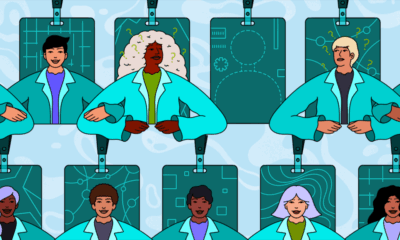Science
High School Teacher Faces AI Cheating Crisis as Students Surge to A’s

A high school English teacher in the Los Angeles Unified School District recently observed a sharp increase in his students’ test scores, with many achieving A’s after struggling throughout the semester. Initially suspecting cheating, teacher Dustin Stevenson discovered that students were using the latest version of Google Lens, a visual search tool that has raised concerns about academic integrity in schools.
Google Lens allows users to click an icon in the Chrome browser, bringing up a sidebar with AI-generated answers and interpretations of images. This feature provides students with an accessible way to cheat on digital tests without needing to type prompts or leave their current page. “I couldn’t believe it,” Stevenson stated. “It’s hard enough to teach in the age of AI, and now we have to navigate this?”
The integration of Chromebooks into classrooms has become widespread, especially following the COVID-19 pandemic, when many districts provided these laptops to facilitate remote learning. Today, approximately 5.8 million K-12 students in California use Chromebooks, making them a standard educational tool. For teachers like William Heuisler, the widespread availability of these devices raised concerns about distractions and cheating. Heuisler opted to revert to traditional methods, using only pencil and paper, to foster independent thinking among his students.
Research from the Center for Democracy and Technology supports these concerns. In a recent nationwide survey, over 70% of teachers expressed doubts about whether their students’ work was genuinely their own due to AI assistance. Furthermore, nearly 75% worried that reliance on AI could hinder the development of essential skills, such as writing and critical thinking.
The Massachusetts Institute of Technology conducted a study titled “Your Brain on ChatGPT,” which revealed that students utilizing AI tools for essay writing exhibited significantly less cognitive activity than those who did not. The essays produced with AI assistance were also of lower quality, featuring limited ideas and vocabulary.
Despite these issues, about 85% of teachers and students reported using AI in various classroom contexts. Teachers often leverage AI for organizing lesson plans and grading, while students utilize it for research and brainstorming. However, the rules governing AI use vary widely among educational institutions.
The California Department of Education has provided guidelines but no strict rules concerning AI’s role in academic integrity. Some educational videos advise against punishing students caught using AI for writing assignments. Instead, they suggest creating assignments that cannot be easily completed by machines or requiring students to acknowledge AI sources in the same manner as traditional references.
Discrepancies in AI policies exist even within schools. A recent survey from the RAND Corporation indicated that only 34% of teachers claimed their districts had consistent AI policies, while 80% of students reported a lack of guidance on appropriate AI use.
Alix Gallagher, a director at Policy Analysis for California Education, emphasized the importance of establishing clear guidelines. “Because adults aren’t clear, it’s actually not surprising that kids aren’t clear,” Gallagher noted. She stressed that districts need to provide comprehensive training for teachers and consistent policies regarding AI use to help students navigate this evolving landscape.
In some classrooms, strict policies against AI usage are in place. For example, Hillary Freeman, a government teacher at Piedmont High School near Oakland, prohibits AI-generated papers, offering zero credit for violations. She allows limited use of AI for summarizing complex concepts or generating practice questions but worries about the long-term implications for students’ critical thinking skills.
As educators grapple with the challenges posed by AI, detecting its use has become another hurdle. Freeman described the added workload of reviewing version histories for potential AI influence or employing plagiarism detection tools, which can be inaccurate and disproportionately flag non-native English speakers.
While Google has not indicated plans to remove Lens from school-issued Chromebooks, the company continues to test various accessibility options. A Google spokesperson stated, “Students have told us they value tools that help them learn and understand things visually.” The company has invested over $40 million in AI literacy initiatives aimed at both students and teachers.
Los Angeles Unified has decided to maintain the availability of Lens on student laptops for now, citing its educational benefits. However, the district has implemented safeguards, ensuring that students complete digital literacy lessons and adhere to academic integrity rules. A spokesperson confirmed, “When certain technologies or features may present concerns, we carefully analyze the risks, benefits, and overall impact on the learning environment.”
The introduction of AI in education is not without its challenges. In 2024, Superintendent Alberto Carvalho unveiled a chatbot aimed at enhancing student engagement, only to halt its development shortly after due to workforce reductions at the technology firm.
As the educational landscape evolves with AI integration, teachers like Stevenson express frustration about the rapid changes. After reporting instances of cheating, he noticed that Lens had been removed from his students’ Chromebooks. “It’s encouraging, but it also reveals how haphazard the introduction of AI has been,” he remarked. “This isn’t how education is supposed to work.”
-

 Science1 month ago
Science1 month agoNostradamus’ 2026 Predictions: Star Death and Dark Events Loom
-

 Technology2 months ago
Technology2 months agoOpenAI to Implement Age Verification for ChatGPT by December 2025
-

 Technology6 months ago
Technology6 months agoDiscover the Top 10 Calorie Counting Apps of 2025
-

 Health4 months ago
Health4 months agoBella Hadid Shares Health Update After Treatment for Lyme Disease
-

 Health5 months ago
Health5 months agoAnalysts Project Stronger Growth for Apple’s iPhone 17 Lineup
-

 Technology4 months ago
Technology4 months agoElectric Moto Influencer Surronster Arrested in Tijuana
-

 Education5 months ago
Education5 months agoHarvard Secures Court Victory Over Federal Funding Cuts
-

 Health5 months ago
Health5 months agoErin Bates Shares Recovery Update Following Sepsis Complications
-

 Technology6 months ago
Technology6 months agoDiscover How to Reverse Image Search Using ChatGPT Effortlessly
-

 Technology7 months ago
Technology7 months agoMeta Initiates $60B AI Data Center Expansion, Starting in Ohio
-

 Technology7 months ago
Technology7 months agoRecovering a Suspended TikTok Account: A Step-by-Step Guide
-

 Science3 months ago
Science3 months agoStarship V3 Set for 2026 Launch After Successful Final Test of Version 2





















